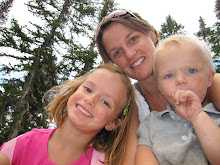
In the last year, all the oldest generation of my family has all but died. I have no grandparents left, and since I started out with 3 sets thanks to a complicated family tree, that's saying something. My great aunt Shirley is the sole survivor in the 80+ crowd of my bloodline. (She's a great one to have left though. Any of you who know me well have heard me talk about Shirley. She's one serious kook and someone not to be trifled with. She embodies sentiments of another time when she says phrases like "great scott" or "my heavenly days, Alli" or "it's on the Boulevard" --meaning Foothill Blvd. She is a keeper and a true family matriarch now.) We are so lucky to have her with us still.
Holidays make me think about family. And this year, it feels a little strange not having the older set to anchor my family to our usual traditions and events. I can already see how not having my grandmother Mere around is going to mean seeing my uncles, aunts, and cousins much less. Time passes and family traditions evolve. It makes sense, times change and families grow, but I picture how difficult it must be for the person in their twilight years, who was once at the center of a family, to suddenly feel more like a leaf on a much larger tree. In one way I suppose that's what we all want when we start a family of our own, to witness something so much larger than ourselves taking shape, but it is easy to fantasize about that when you are stuck in your prime years, little family emerging and growing. It might be a bit more bitter pill to swallow when you are the old one at the table struggling to keep up with the conversation about ipads and Facebook and Toy Story 3.
One of the things I admire about traditional cultures is the way elderly people are revered and honored. Even once you die, you are still an important piece of society because the concept of respected "ancestors" is so central to many of these cultures. Some even believe the ancestor spirits are ever-present influencing for better or worse what happens in the daily life of the living. I like this belief that those who went before should inform the decisions you make in your life. It seems so comforting and smart, kind of like listening to a life coach or something. But it's simply a foreign notion in American life. I'm not saying we don't mourn our dead, of course we do, but we don't collectively spend much time thinking about what the previous generation would want us to do. It feels irrelevant in our world of personal choice and fixation with progress. Looking back isn't an American, or some might even say Western, direction of thought.
I can't say that I always listened rapt when Mere or other grandparents were telling their tales or doling out advice, but now that I can't hear it, I miss the chance to. I'd really love to ask Mere some questions about her carmel sauce technique and hear my Grandma Lou say "Raoul and Felipe" (her names for the 2 elevators in her building) in her best tongue rolling Spanish accent. I think it's difficult not to see our elderly as stereotypes. We forget to look past the wrinkles and bad Christmas sweatshirts and see their former youth spent full of days that probably really resembled our own. I wish that I could have looked further past Mere's critical eye for decadence and material possessions and focused more on the reasons behind her criticism. What was it like living through the depression and having your mother sew wedding dresses to put clothes on your back?
I find it a wee bit ironic that we fixate on our kids knowing factoids of history like "1492 Columbus sailed the ocean blue", and yet most of us couldn't probably give a significant personal family history date like when our parents were married or the year our grandparents were born. Living history, that's what or older family members are. I'm a fan of living history. I know I'm always referencing, nerd-like, radio shows, but I truly adore the tiny segments on NPR made by Storycorps. Usually less than 5 minutes, they are snippets of interviews between family members or friends. It's just one person asking another person about their life and significant (or not) moments from it. I love hearing these intimate pieces of a stranger's story and how the interviewer relates to it. It is surprisingly hard to interview someone you know well. I took my Dad into a Storycorp booth a couple summers ago when they were traveling through SLC and we recorded an interview. It was an experience I treasure-emotional wreck of an interviewer though I was- and I now have a documented, recorded piece of our shared living family history. It makes me proud. But why haven't I extended this experience to pretty much everyone I know, particularly those I know who are likely in their last years?
Storycorps motto is "Every life matters." I believe this too, so this holiday season, when I am sure to see my family, old and grey and young and dewy alike, I am going to challenge myself to think like an interviewer and find out some facts and life history about those around me. Storycorps has a list of great questions to use as a stepping off point. It might not be the usual cocktail hour conversation but it is something I know I can fell good about doing. Check the list out. Maybe you will find out that you want some of these answers for yourself at your next holiday shindig?.....





